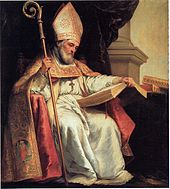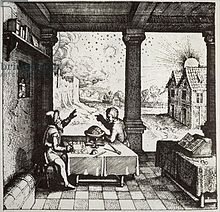Christian views on astrology

Astrology had support in early Christianity, but support declined during the Middle Ages.[1] Support for it grew again in the West during the Renaissance.
Ancient
Medieval

The first astrological book published in Europe was the Liber Planetis et Mundi Climatibus ("Book of the Planets and Regions of the World"), which appeared between 1010 and 1027 AD, and may have been authored by
In Paradiso, the final part of the Divine Comedy, the Italian poet Dante Alighieri referred "in countless details"[9] to the astrological planets, though he adapted traditional astrology to suit his Christian viewpoint,[9] for example using astrological thinking in his prophecies of the reform of Christendom.[10]
Objections

In the seventh century,
Early modern period

Martin Luther denounced astrology in his Table Talk. He asked why twins like Esau and Jacob had two different natures yet were born at the same time. Luther also compared astrologers to those who say their dice will always land on a certain number. Although the dice may roll on the number a couple of times, the predictor is silent for all the times the dice fails to land on that number.[21]
What is done by God, ought not to be ascribed to the stars. The upright and true Christian religion opposes and confutes all such fables.[21]
— Martin Luther, Table Talk
Luther also went on to say:
Astrology is framed by the devil, to the end people may be scared from entering into the state of matrimony, and from every divine and human office and calling; for the star-peepers presage nothing that is good out of the planets; they affright people’s consciences, in regard of misfortunes to come, which all stand in God’s hand, and through such mischievous and unprofitable cogitations vex and torment the whole life. Great wrong is done to God’s creatures by the star-expounders. God has created and placed the stars in the firmament, to the end they might give light to the kingdoms of the earth, make people glad and joyful in the Lord, and be good signs of years and seasons. But the star-peepers feign that those creatures, of God created, darken and trouble the earth, and are hurtful; whereas all creatures of God are good, and by God created only for good, though mankind makes them evil, by abusing them. Eclipses, indeed, are monsters, and like to strange and untimely births. Lastly, to believe in the stars, or to trust thereon, or to be affrighted thereat, is idolatry, and against the first commandment.[21]
— Martin Luther,Table Talk
Renaissance

English astrology had reached its zenith by the 17th century.
Enlightenment period
During the
Modern
Astrology saw a popular revival starting in the 19th century, as part of a general revival of spiritualism and, later, New Age philosophy,[31]: 239–249 and through the influence of mass media such as newspaper horoscopes.[31]: 259–263 Early in the 20th century the psychiatrist Carl Jung developed some concepts concerning astrology,[32] which led to the development of psychological astrology.[31]: 251–256 [33][34]
The
All forms of divination are to be rejected: recourse to Satan or demons, conjuring up the dead or other practices falsely supposed to "unveil" the future. Consulting horoscopes, astrology, palm reading, interpretation of omens and lots, the phenomena of clairvoyance, and recourse to mediums all conceal a desire for power over time, history, and, in the last analysis, other human beings, as well as a wish to conciliate hidden powers. They contradict the honor, respect, and loving fear that we owe to God alone.[36]
— Catechism of the Catholic Church
See also
- Astrology and science
- Christian mysticism
- Christianity and paganism
- Esoteric Christianity
- Jesus Christ in comparative mythology
- Jewish views on astrology
- Muslim views on astrology
- Sol Invictus
Notes
- Astrologer William Lilly's book Christian Astrology (1647) is a noted work.
References
- ^ Magic in the Intellectual History of Europe.
- ISBN 978-90-04-10925-4.
- ^ http://astrologyclub.org/why-christianity-opposed-astrology/ July 20116
- ^ ISBN 978-0-313-33190-9.
- ^ a b Campion, 1982. p. 44.
- ^ Campion, 1982. p. 45.
- ^ a b Campion, 1982. p. 46.
- ^ North, John David (1986). "The eastern origins of the Campanus (Prime Vertical) method. Evidence from al-Bīrūnī". Horoscopes and history. Warburg Institute. pp. 175–176.
- ^ JSTOR 2865916.
Dante's interest in astrology has only slowly been gaining the attention it deserves. In 1940 Rudolf Palgen published his pioneering eighty-page Dantes Sternglaube: Beiträge zur Erklärung des Paradiso, which concisely surveyed Dante's treatment of the planets and of the sphere of fixed stars; he demonstrated that it is governed by the astrological concept of the "children of the planets" (in each sphere the pilgrim meets souls whose lives reflected the dominant influence of that planet) and that in countless details the imagery of the Paradiso is derived from the astrological tradition. ... Like Palgen, he [Kay] argues (again, in more detail) that Dante adapted traditional astrological views to his own Christian ones; he finds this process intensified in the upper heavens.
- JSTOR 40166243.
It can hardly be doubted, I think, that Dante was thinking in astrological terms when he made his prophecies. [The attached footnote cites Inferno. I, lOOff.; Purgatorio. xx, 13-15 and xxxiii, 41; Paradiso. xxii, 13-15 and xxvii, 142-148.]
- ^ a b Wood, 1970. p. 5
- ^ Isidore of Seville (c. 600). Etymologiae. pp. L, 82, col. 170.
- ^ Gower, John (1390). Confessio Amantis. pp. VII, 670–84.
Assembled with Astronomie / Is ek that ilke Astrologie / The which in juggementz acompteth / Theffect, what every sterre amonteth, / And hou thei causen many a wonder / To tho climatz that stonde hem under.
- ^ Wood, 1970. p. 6
- ^ Allen, Don Cameron (1941). Star-crossed Renaissance. Duke University Press. p. 148.
- ^ a b Wood, 1970. pp. 8–11
- ^ Coopland, G. W. (1952). Nicole Oresme and the Astrologers: A Study of his Livre de Divinacions. Harvard University Press; Liverpool University Press.
- ^ Vanderjagt, A.J. (1985). Laurens Pignon, O.P.: Confessor of Philip the Good. Venlo, The Netherlands: Jean Miélot.
- ^ Veenstra, 1997. pp. 5, 32, passim
- ^ Veenstra, 1997. p. 184
- ^ a b c "OF ASTRONOMY AND ASTROLOGY". Table Talk. Retrieved 15 October 2022.
- ^ a b c d e Campion, 1982. p. 47.
- ISBN 978-0-300-14316-4.
- ^ ISBN 978-0-300-14316-4.
- ^ Astronomical diagrams by Thomas Hood, Mathematician (Vellum, in oaken cases). British Library (Add MS 71494 & 71495): British Library. c. 1597.
{{cite AV media}}: CS1 maint: location (link) - ^ Johnston, Stephen (July 1998). "The astrological instruments of Thomas Hood". XVII International Scientific Instrument Symposium. Soro. Retrieved 12 June 2013.
- S2CID 144443271.
- ^ Cummins A (2012) The Starry Rubric: Seventeenth-Century English Astrology and Magic, p. 3. France:Hadean Press
- ^ Cummins A (2012) The Starry Rubric: Seventeenth-Century English Astrology and Magic, p. 43–45. France:Hadean Press
- ^ ISBN 0-14-025028-X.
he did not even trouble readers with formal disproofs!
- ^ ISBN 978-1-4411-8129-9.
At the same time, in Switzerland, the psychologist Carl Gustav Jung (1875–1961) was developing sophisticated theories concerning astrology ...
- ISBN 978-0-691-09895-1.
Letter from Jung to Freud, 12 June 1911 "I made horoscopic calculations in order to find a clue to the core of psychological truth."
- ISBN 3-540-20856-9
- ISBN 978-1-84725-224-1
- ISBN 0-87973-669-0.
- ^ "Catechism of the Catholic Church - Part 3". Retrieved 8 July 2012.
